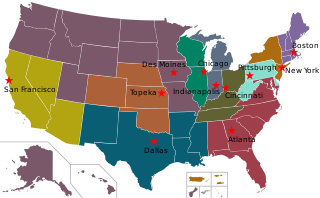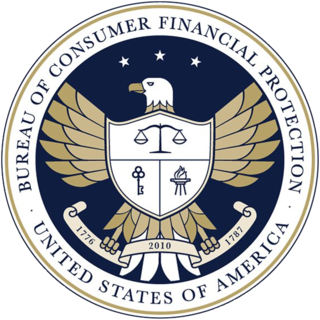
The Gramm–Leach–Bliley Act (GLBA), also known as the Financial Services Modernization Act of 1999, is an act of the 106th United States Congress (1999–2001). It repealed part of the Glass–Steagall Act of 1933, removing barriers in the market among banking companies, securities companies, and insurance companies that prohibited any one institution from acting as any combination of an investment bank, a commercial bank, and an insurance company. With the passage of the Gramm–Leach–Bliley Act, commercial banks, investment banks, securities firms, and insurance companies were allowed to consolidate. Furthermore, it failed to give to the SEC or any other financial regulatory agency the authority to regulate large investment bank holding companies. The legislation was signed into law by President Bill Clinton.

The Federal Home Loan Banks are 11 U.S. government-sponsored banks that provide liquidity to financial institutions to support housing finance and community investment.

The Fair and Accurate Credit Transactions Act of 2003 is a U.S. federal law, passed by the United States Congress on November 22, 2003, and signed by President George W. Bush on December 4, 2003, as an amendment to the Fair Credit Reporting Act. The act allows consumers to request and obtain a free credit report once every 12 months from each of the three nationwide consumer credit reporting companies. In cooperation with the Federal Trade Commission, the three major credit reporting agencies set up the web site AnnualCreditReport.com to provide free access to annual credit reports.

The Credit Union National Association, commonly known as CUNA, was a national trade association for both state- and federally chartered credit unions located in the United States. CUNA provided member credit unions with trade association services, such as lobbying, regulatory advocacy, professional development, and professional services management. The organization operated out of its headquarters in Washington, D.C., and an operations center in Madison, Wisconsin. CUNA's president and chief executive officer Jim Nussle led the organization since September 2014 and now leads its successor organization, America's Credit Unions.

The Real Estate Settlement Procedures Act (RESPA) was a law passed by the United States Congress in 1974 and codified as Title 12, Chapter 27 of the United States Code, 12 U.S.C. §§ 2601–2617. The main objective was to protect homeowners by assisting them in becoming better educated while shopping for real estate services, and eliminating kickbacks and referral fees which add unnecessary costs to settlement services. RESPA requires lenders and others involved in mortgage lending to provide borrowers with pertinent and timely disclosures regarding the nature and costs of a real estate settlement process. RESPA was also designed to prohibit potentially abusive practices such as kickbacks and referral fees, the practice of dual tracking, and imposes limitations on the use of escrow accounts.

Public Law 110-343 is a US Act of Congress signed into law by U.S. President George W. Bush, which was designed to mitigate the growing financial crisis of the late-2000s by giving relief to so-called "Troubled Assets."

The Credit Card Accountability Responsibility and Disclosure (CARD) Act of 2009 is a federal statute passed by the United States Congress and signed by U.S. President Barack Obama on May 22, 2009. It is a comprehensive credit card reform legislation that aims "to establish fair and transparent practices relating to the extension of credit under an open end consumer credit plan, and for other purposes." The bill was passed with bipartisan support by both the House of Representatives and the Senate.

The Dodd–Frank Wall Street Reform and Consumer Protection Act, commonly referred to as Dodd–Frank, is a United States federal law that was enacted on July 21, 2010. The law overhauled financial regulation in the aftermath of the Great Recession, and it made changes affecting all federal financial regulatory agencies and almost every part of the nation's financial services industry.
The Center for Responsible Lending (CRL) is a nonprofit organization research and policy group based in Durham, North Carolina, United States. Its stated purpose is to educate the public about financial products and to push for policies that curb predatory lending. On its website and elsewhere, CRL describes its mission as that of "protecting homeownership and family wealth by working to eliminate abusive financial practices." CRL is affiliated with the Center for Community Self-Help.

The Financial Stability Oversight Council (FSOC) is a United States federal government organization, established by Title I of the Dodd–Frank Wall Street Reform and Consumer Protection Act, which was signed into law by President Barack Obama on July 21, 2010. The Office of Financial Research is intended to provide support to the council.

The Consumer Financial Protection Bureau (CFPB) is an independent agency of the United States government responsible for consumer protection in the financial sector. CFPB's jurisdiction includes banks, credit unions, securities firms, payday lenders, mortgage-servicing operations, foreclosure relief services, debt collectors, for-profit colleges, and other financial companies operating in the United States. Since its founding, the CFPB has used technology tools to monitor how financial entities used social media and algorithms to target consumers.

The Swaps Regulatory Improvement Act is a bill that would amend the Dodd–Frank Wall Street Reform and Consumer Protection Act. The Swaps Regulatory Improvement Act would improve the ability of banks to use swaps as a tool for hedging risk. If Dodd-Frank is not amended, non-bank institutions will have to do many of the swap trades instead. H.R. 992 passed the House during the 113th United States Congress.

The Consumer Financial Protection Safety and Soundness Improvement Act of 2013 is a bill that would restructure the Consumer Financial Protection Bureau (CFPB) by transforming it into a five-person commission and removing it from the Federal Reserve System. The CFPB would be renamed the "Financial Product Safety Commission." This bill is also intended to make overturning the decisions about regulations that the new commission makes easier to do.

Michael E. Fryzel is an American attorney with offices in Chicago, Illinois. Following the 2016 general election, Fryzel served on President Donald J. Trump's Transition Team and developed the Agency Action Plan for the National Credit Union Administration.

The Credit Union Share Insurance Fund Parity Act is a bill that would expand federal deposit insurance to include Interest on Lawyer Trust Accounts (IOLTAs) and similar escrow accounts housed within credit unions.

The CFPB Rural Designation Petition and Correction Act is a United States bill that would amend the Dodd-Frank Wall Street Reform and Consumer Protection Act to direct the Consumer Financial Protection Bureau (CFPB) to establish an application process that would allow a person to get their county designated as "rural" for purposes of a federal consumer financial law. One practical effect of having a county designated "rural" is that people can qualify for some types of mortgages by getting them exempted from the CFPB's qualified mortgage rule.

The Mortgage Choice Act of 2013 is a bill that would direct the Consumer Financial Protection Bureau (CFPB) to amend its regulations related to qualified mortgages to reflect new exclusions made by this bill. The CFPB released new regulations regarding the definition of a Qualified Mortgage that took effect in January 2014, a definition that this bill would modify.
Financial CHOICE Act is a bill introduced to the 115th United States Congress in 2017 that would, if enacted, roll back "many of the protections in the landmark Dodd-Frank 2010 federal law, including the "strongest" Wall Street "regulations from the financial crisis. The legislation passed the House 233–186 on June 8, 2017. The 600-page legislation was crafted by Congressman Jeb Hensarling (R-TX), chair of the House Financial Services Committee.
In consumer lending, mortgage origination, a specialized subset of loan origination, is the process by which a lender works with a borrower to complete a mortgage transaction, resulting in a mortgage loan. A mortgage loan is a loan in which property or real estate is used as collateral. During this process, borrowers must submit various types of financial information and documentation to a mortgage lender, including tax returns, payment history, credit card information and bank balances. Mortgage lenders use this information to determine the type of loan and the interest rate for which the borrower is eligible. The process in the United States has become complex due to the proliferation of loan products and consumer protection regulations.
The Dodd–Frank Wall Street Reform and Consumer Protection Act was created as a response to the financial crisis in 2007. Passed in 2010, the act contains a great number of provisions, taking over 848 pages. It targets the sectors of the financial system that were believed to be responsible for the financial crisis, including banks, mortgage lenders, and credit rating agencies. Ostensibly aimed at reducing the instability that led to the crash, the act has the power to force these institutions to reduce their risk and increase their reserve capital.





